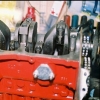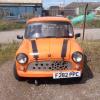Alright mini peeps.
I am just wondering what bolts i should/shouldn't be using copper grease on if any?
There is alot of different views on copper grease the main one being: "if copper grease is applied to the thread it changes the torque settings as there is reduced friction". I just wanted to know what other people's views are on this subject and if there are certain bolts i should not use it on i.e wheelnuts.
What do i do about torque settings? (just tighten till i cant tighten anymore (not with a torque wrench of course lol))
Does it matter if using them on brake parts as i have read it can cause problems because of the heat?
Its mostly just suspension parts i am working on at the moment, putting the rear and front subframe assembly together.
Thank you in advance for your help.
SE





















